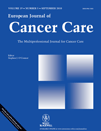The outcome and prognostic factors in patients with aspiration pneumonia during concurrent chemoradiotherapy for head and neck cancer
Abstract
CHEN S.-W., YANG S.-N., LIANG J.-A. & LIN F.-J. (2010) European Journal of Cancer Care19, 631–635
The outcome and prognostic factors in patients with aspiration pneumonia during concurrent chemoradiotherapy for head and neck cancer
This study aimed to investigate the outcome in patients with aspiration pneumonia during definitive concurrent chemoradiotherapy for head and neck cancer. The data of 595 patients with head and neck cancer treated by chemoradiotherapy were reviewed. Forty-one patients were identified as developing symptomatic aspiration pneumonia during treatment and were analysed for this study. The definition of symptomatic aspiration pneumonia fit three criteria: (1) at least one event of aspiration during the treatment or evidence of grade 2 or above dysphagia during treatment; (2) clinical or radiographic signs of pneumonia or pneumonitis; and (3) no evidence of grade 4 haematological toxicity before the outbreak of pneumonia. Termination of allocated radiotherapy was noted in 10 patients. A treatment break was observed in 26 patients, whereas irradiation was prolonged more than 1 week in 11 patients. Logistic regression analysis showed the dysphagia score during the treatment course and the chest roentgenography pattern following symptomatic aspiration pneumonia were found to independently influence the outcome. Aspiration pneumonia occurring during chemoradiotherapy for head and neck cancer has a detrimental effect on the treatment outcome. Intensive medical care is essential for this group of patients with a dysphagia score of 3 during treatment and an unfavourable chest film pattern.




